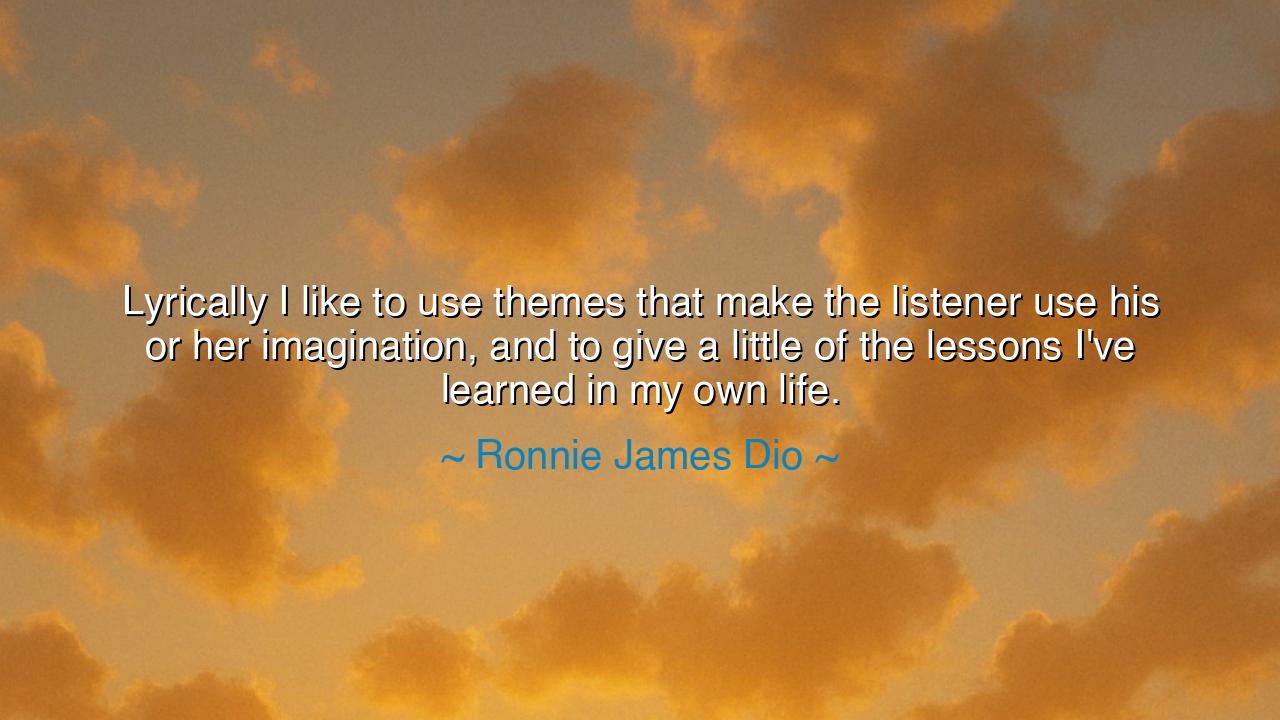
Lyrically I like to use themes that make the listener use his or
Lyrically I like to use themes that make the listener use his or her imagination, and to give a little of the lessons I've learned in my own life.






“Lyrically I like to use themes that make the listener use his or her imagination, and to give a little of the lessons I've learned in my own life,” said Ronnie James Dio, the legendary voice of heavy metal — a singer not only of thunder and fire, but of myth and meaning. In this reflection, Dio reveals the sacred purpose behind his art: to awaken the imagination of those who hear, and to weave into his songs the wisdom born of his own trials. To him, music was not merely sound, but a bridge between the earthly and the eternal — a medium through which truth could be cloaked in story, and experience transformed into legend.
Dio, whose powerful voice and commanding presence made him one of the most revered figures in rock, understood something the ancients also knew: that truth, when spoken plainly, may instruct the mind — but when sung with imagination, it touches the soul. His lyrics, filled with dragons, angels, and warriors, were not childish fantasies but symbols — allegories of courage, of faith, of the eternal battle between light and darkness within the human heart. In this way, he followed the same tradition as Homer, Dante, and Milton — artists who used myth to reveal moral truth. The imagination, he believed, was the gateway through which wisdom entered the spirit.
When Dio says he writes songs to make the listener “use his or her imagination,” he speaks of a sacred exchange between artist and audience. The artist does not command, but invites; he does not dictate meaning, but opens a door for the listener to walk through and find their own. This is the difference between entertainment and art. Entertainment amuses — art awakens. Through his music, Dio called upon his listeners to see themselves as heroes in their own epic stories, to rise against despair, and to seek the light even in the face of overwhelming darkness. In his world of lyric and legend, imagination becomes not escape, but empowerment.
Throughout history, artists have used this same method — to teach through symbol, to guide through wonder. Consider Aesop, whose fables clothed truth in animal skins so that even children could grasp wisdom beyond their years. Or William Blake, who declared that imagination was “the divine body in every man.” Like Dio, they understood that the deepest truths cannot always be spoken directly; they must be felt first, through image, through rhythm, through story. Dio’s lyrics — from “Holy Diver” to “Heaven and Hell” — are modern myths born of this ancient fire. They challenge the listener not just to hear, but to see, to think, to dream.
Yet Dio’s words also reveal humility. He does not claim to be a prophet, only a man sharing “the lessons I've learned in my own life.” These are the lessons of perseverance through struggle, of integrity in a world of compromise, of hope amid sorrow. The lessons of the artist are not sermons from on high, but reflections of the human journey itself. His trials, like ours, became the forge of wisdom; and through his songs, he offered that wisdom to others — not as commandment, but as companionship. This is why his music endures: it speaks not only to the ear, but to the human condition.
In a time when the world grows loud with empty words, Dio’s philosophy reminds us of something eternal: that imagination and experience together form the path to understanding. The imagination alone may soar but loses its way; experience alone may ground but never transcend. Joined, they become a force both human and divine. The artist’s task — and perhaps every person’s — is to draw from life’s sorrows and victories alike, and to transform them into something luminous, something that stirs others to live with greater vision and courage.
So let this be the teaching: speak through your imagination, and live through your lessons. Whatever your art — whether in words, deeds, or song — let it reflect both your dreams and your truths. Do not fear to wrap wisdom in wonder, nor to clothe truth in beauty. For the imagination, as Dio knew, is not a mere escape from reality — it is the fire that gives reality its meaning. When you share what you have learned through the creative spark within you, you become a torchbearer in the long procession of human storytelling — one more voice calling others to rise, to dream, and to become more than they believed they could be.
Thus, follow Dio’s path: live deeply, learn greatly, and create boldly. For the imagination, when joined with experience, becomes not only the artist’s gift — it becomes the soul’s voice to the world.






AAdministratorAdministrator
Welcome, honored guests. Please leave a comment, we will respond soon